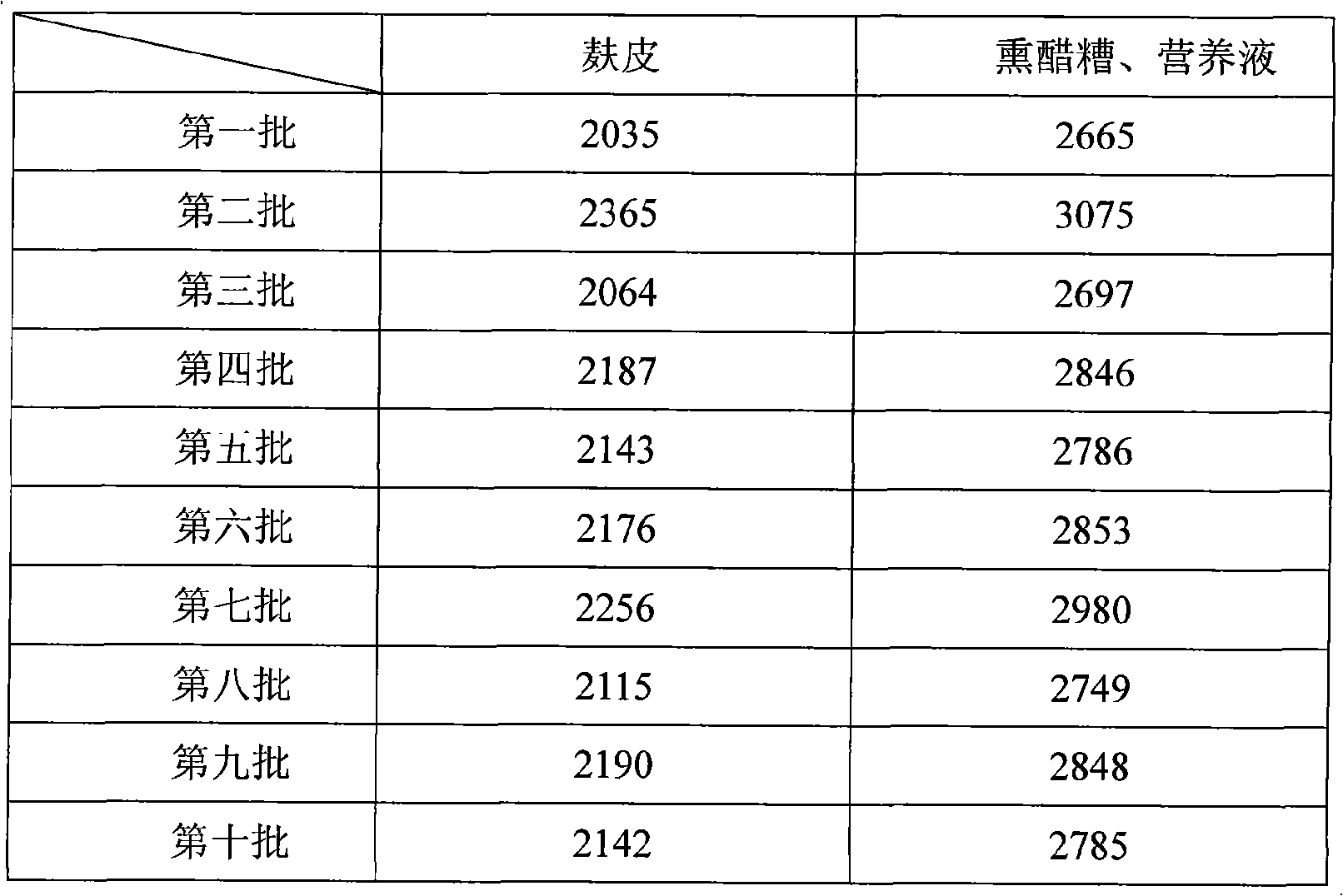Method for starter propagation by utilizing smoked vinegar lees
A technology of fumigated vinegar grains and smoked vinegar grains, which is applied in the field of food processing, can solve the problems of unstable source quality of koji-making raw materials, poor control of bran thickness and quality, large output of smoked vinegar grains, etc., and achieve mycelial distribution Wide, good economic and social benefits, and the effect of shortening the fermentation time
- Summary
- Abstract
- Description
- Claims
- Application Information
AI Technical Summary
Problems solved by technology
Method used
Image
Examples
Embodiment 1
[0027] A method for making koji by using smoked vinegar, comprising the following steps: (1) first making the original species of Aspergillus niger into inoculum; The nutrient solution is mixed and stirred evenly to form a mixed material, and then water is added to adjust the moisture of the mixed material to be 60%. The nutrient solution is made up of the following raw materials in weight percentage: corn dextrin 1%, glucose 0.2%, magnesium sulfate 0.02%, Ammonium nitrate 1.0%, potassium chloride 0.2%, ferrous sulfate 0.005%, soybean powder 0.5%, and all the other are water; (3) inoculate and cultivate the Aspergillus niger inoculum by 3% of the mixed material weight; (4) mix The inoculated material is put into a ventilated fermentation tank to ferment for about 40 hours, and the fermentation temperature is 30° C.; (5) finally spread the fermented bran koji thinly and dry to make bran koji.
Embodiment 2
[0029] A method for making koji by using smoked vinegar, comprising the following steps: (1) first making the original species of Aspergillus niger into inoculum; (2) adding fresh smoked vinegar and 10% of the fresh smoked vinegar The nutrient solution is mixed and stirred evenly to form a mixed material, and then water is added to adjust the moisture of the mixed material to be 65%. The nutrient solution is made up of the following raw materials in weight percentage: corn dextrin 2%, glucose 1%, magnesium sulfate 0.08%, Ammonium nitrate 2.0%, potassium chloride 0.6%, ferrous sulfate 0.01%, soybean powder 1.5%, all the other are water; (3) inoculate and cultivate the good Aspergillus niger seed bacteria by 5% of the mixed material weight; (4) mix The inoculated material is put into a ventilated fermentation tank to ferment for about 50 hours, and the fermentation temperature is 35° C.; (5) finally spread the fermented bran koji thinly and dry to make bran koji.
Embodiment 3
[0031] A method for making koji by using smoked vinegar, comprising the following steps: (1) first making the original species of Aspergillus niger into inoculum; The nutrient solution is mixed and stirred evenly to form a mixed material, and then water is added to adjust the moisture of the mixed material to 65%. The nutrient solution is made up of the following raw materials in weight percentage: corn dextrin 2%, glucose 0.2%, magnesium sulfate 0.03%, Ammonium nitrate 2.0%, potassium chloride 0.4%, ferrous sulfate 0.008%, soybean powder 1.0%, all the other are water; (3) inoculate and cultivate the good Aspergillus niger inoculum by 3% of the mixed material weight; (4) mix The inoculated material is put into a ventilated fermentation tank to ferment for about 50 hours, and the fermentation temperature is 32° C.; (5) Finally, spread the fermented bran koji thinly and dry to make bran koji.
PUM
 Login to View More
Login to View More Abstract
Description
Claims
Application Information
 Login to View More
Login to View More - Generate Ideas
- Intellectual Property
- Life Sciences
- Materials
- Tech Scout
- Unparalleled Data Quality
- Higher Quality Content
- 60% Fewer Hallucinations
Browse by: Latest US Patents, China's latest patents, Technical Efficacy Thesaurus, Application Domain, Technology Topic, Popular Technical Reports.
© 2025 PatSnap. All rights reserved.Legal|Privacy policy|Modern Slavery Act Transparency Statement|Sitemap|About US| Contact US: help@patsnap.com

